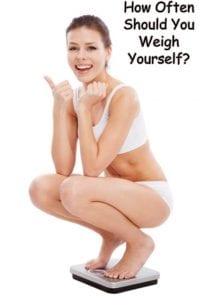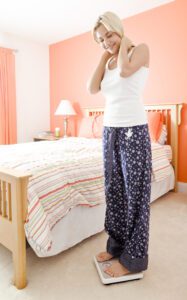 How often should you weigh yourself when trying to lose weight is a question often asked of dieticians and nutritionists.
How often should you weigh yourself when trying to lose weight is a question often asked of dieticians and nutritionists.
According to conventional wisdom, weighing yourself more than once a week was not beneficial, and daily weigh-ins could cause unnecessary stress.
This is because our weight can vary by a pound or two due to fluid retention following a meal with high sodium content, or through not having gone to the bathroom.
This weight variation might not sound like anything to worry about if you’re not trying to lose weight, but it’s not very encouraging to anyone who is.
Following the outcome of several studies linking daily weigh-ins to improved weight loss and weight maintenance, some weight-loss experts now say that we should weigh ourselves every day.
One important caveat: None of the studies referred to below included people with a history of eating disorders. Nor did they include anyone who was weight-obsessed and might have responded to weight loss or weight gain by binging or starving themselves.
Table of Contents
Study Results
Recent research centered around how often we should weigh ourselves when trying to lose weight include the following:
• One study followed a group of first-year college students instructed to weigh themselves once a day for three months. The freshman year is a time when young adults are often away from home for the first time. Rather than cook, they tend to live on pizza and other fast foods.
It’s quite remarkable that these students did not gain any weight. Their classmates who did not weigh themselves daily gained an average of 5 pounds during this time.
• A two-year study followed 162 overweight and obese gym members who weighed themselves once a day and recorded their results. They lost a significant amount of weight throughout the study and keep it off after.
• A study involving 92 overweight individuals who weighed themselves daily on a digital bathroom scale and uploaded their results online found that they lost twice as much weight as those who weighed themselves weekly.
Next, we will look at what people in the fitness industry are saying about daily versus weekly weigh-ins.
Personal Trainer on How Often You Should Weigh Yourself When Trying to Lose Weight
What the Experts are Saying
Some experts believe that there are no adverse outcomes from daily weigh-ins. They say that they encourage us to stick with what’s working and  change what isn’t.
change what isn’t.
If we find we’ve gained a little weight one day, we may consciously or even unconsciously cut back our food intake.
Frequent weigh-ins also enable us to notice patterns and act on them.
For example, if we eat a substantial calorie-laden meal containing a lot of salt, we may gain three or four pounds. People who weigh themselves daily will be aware of this weight gain and may choose to consume fewer calories for the next few days.
Similarly, someone who sees their weight dropping a few days in a row after cutting out dessert may be encouraged to stick with their new way of eating.
An extensive survey of dieters revealed that many who hopped on a weighing scale daily consider this a critical factor in their weight loss.
These people said that knowing that they would weigh themselves the next day helped them to keep their eating in check.
Additionally, National Weight Control Registry data shows that people who decrease their weigh-in frequency tend to regain any weight they’ve lost.
Not everyone is for daily weigh-ins, however.
Some weight-loss experts think we can start identifying our self-worth with the number on the scale. For such people, it can be more beneficial to pay attention to waist size and the fit of their clothing.
Daily Weighing Tips
Weigh yourself at the same time, in the same state of undress, each day.
Most fitness and weight loss experts agree that mornings are the best time to do this, as this is when we typically weigh the least.
Hopping on the scale after exercising can be inaccurate as some of the perceived weight loss could be water loss.
Note your weight loss in a diary. Alternatively, buy a Wi-Fi-enabled scale that will record your progress then send it to an app or website.
A digital scale will also track your Body Mass Index (BMI), which is a measure of weight in relation to height, and your body fat percentage.
Keep in mind, though, that your BMI will decrease far more slowly than your weight. Also, according to experts, body fat measurements are not always accurate.
Final Words on How Often Should You Weigh Yourself When Trying to Lose Weight
So, how often should you weigh yourself when trying to lose weight? 
If daily weigh-ins will help to keep you accountable, weigh yourself daily. Don’t forget that weight fluctuations are inevitable.
If seeing the number on the scale go up will drive you crazy, stick with weekly weigh-ins.
If you decide to weigh yourself daily, stick to once a day.
Jumping on the scale multiple times a day won’t benefit you and could cause you to become obsessed with your weight, which isn’t healthy.
In a nutshell, there is no definitive answer to the question, how often should you weigh yourself when trying to lose weight.
Some people seldom never weigh themselves, preferring to use the fit of their clothing as a guideline. Experiment, and see what suits you best.
If you enjoyed this article, you might also like to read How to Use a Body Fat Scale.

